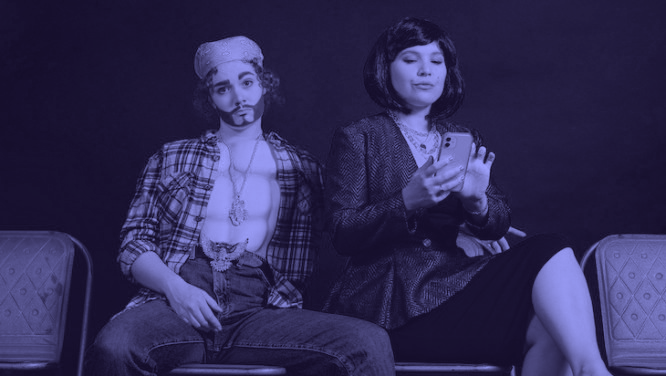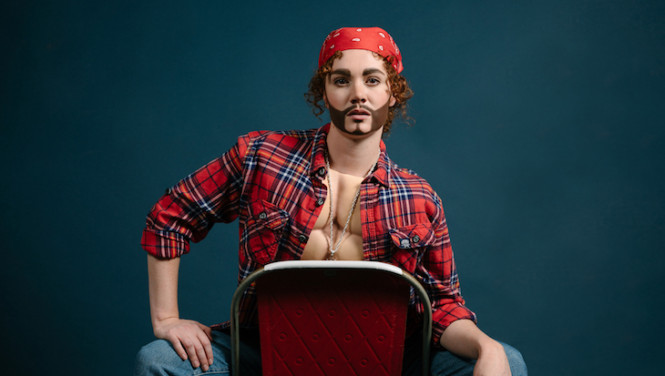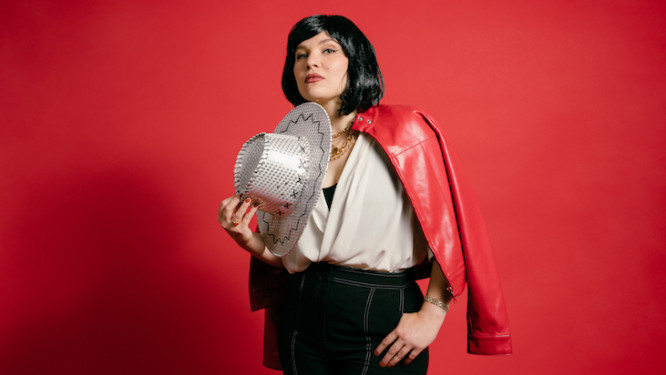
‘Love Don’t Cost a King’ // The Butterfly Club
‘Love Don’t Cost a King’ was amorous.
As the end of the 2022 Melbourne International Comedy Festival steadily draws near, audiences are flocking to the CBD to snap up last-minute tickets to their favourite and most anticipated shows. Melbourne has enjoyed an array of established and emerging talent over the past month. The city’s affinity for live theatre, particularly comedy, is undeniable. This sentiment also rings true of one of Melbourne’s prime cabaret establishments, The Butterfly Club, which stages shows as diverse as its own aesthetic.For the final week of the Comedy Festival, The Butterfly Club has rolled out the red carpet for comedy royalty – Michelle McCowage and Jane Schon’s drag king show, ‘Love Don’t Cost a King’.
Told through a series of songs and farcical interludes, ‘Love Don’t Cost a King’ is an exploration of gender non-conformity and 21st-century romance. The brainchild of recent Victorian College of the Arts graduates McCowage (she/they) and Schon (she/her), the comedy tells the story of Tennessee-based country singer DK and his highly strung manager Glenda as they embark on a tour throughout Australia. Providing both ample opportunities to display their comedic range, ‘Love Don’t Cost a King’ is a rollercoaster of hilarity, with some definite highs, as well as a few mediocre descents.
Staged centrally in the heart of Melbourne’s city centre, McCowage and Schon’s venue choice of The Butterfly Club is appealing. Classed as a premium hub for independent theatre, comedy, and cabaret, The Butterfly Club offers a rich history of talent, with the likes of Ali McGregor, Eddie Perfect, and Tim Minchin all performing there during the formative years of their careers. Guests will not know where to look as they ascend the staircase to the atrium bar and theatre. Offering an eclectic collection of historic, global memorabilia, guests could easily spend hours gazing at the museum-esque lobby.
Once audience members are called upon to head upstairs to take their seats, however, the theatre’s aesthetic changes. Situated in the building’s loft, the theatre is quite simple, with a variety of seats ranging from classroom chairs to would-be church pews. Navy-painted walls encapsulate the audience, providing a cool, intimate vibe. A red velvet curtain drapes the stage in a similar vein to Baz Luhrmann’s ‘Moulin Rouge!’. Jennifer Lopez’s early 2000s hit, ‘Love Don’t Cost a Thing’, the namesake for the show to be performed, reverberates around the theatre. Dimmed overhead lights cast the theatre in a lukewarm glow, beckoning audiences into the theatre with curious anticipation. As the lights transition from dim to darkness, a hush falls over the audience, ready to be in the presence of a king.
For the majority of its performance, ‘Love Don’t Cost a King’ relies heavily on the imagination of its audience rather than excessive props and audio-visual cues. This is a smart move for the purpose of storytelling thanks to the removal of physical limitations upon the stage space. McCowage, as the lustful DK, makes great use of the empty stage. McCowage’s imaginative interaction with their surroundings is best displayed during a party scene where they pretend to be flung around a raging crowd. Their patent for physical humour is one of the show’s strongest elements, as she embraces the freedom of unrestrained space onstage.
This element of miming arguably works better than when props are intermittently used. DK’s propensity for drinking is humorously signified early on through the motion of downing two imaginary wines consecutively. Using a bottle later in the show, while a clever signifier for DK’s personal and professional decline, feels somewhat jarring in contrast to earlier instances of simulated drinking. The similar use of a mannequin stand-in for real-life sensation Doja Cat, while creatively humorous, adds little to the overarching narrative or presentation.
In contrast, the lighting, audio-visual, and sound choices throughout ‘Love Don’t Cost a King’ are well considered. Transitions between scenes are well signified, with the use of concert spotlights and an overhead disco ball being used regularly. The use of the latter is particularly effective, as it allows for a feeling of privilege and excess as the story progresses.
Halfway through the show, McCowage pulls back the right-hand side of the crimson curtain to reveal a mounted television set displaying images of a young DK, which serves as a backing visual for DK’s ode to his mother. While simple, the scene humorously pokes fun at the over-sentimental nature of the music industry’s passion for biographical power ballads.
Additionally, very few scenes are unaccompanied by sound or music. With music being the focal point of the show, this is a wise decision. Occasionally, music is used for laughs (such as revealing that DK does not always play his own guitar), with the music choices, for the most part, being well-suited. Although occasionally too loud, the catalogue of original songs is relatively catchy and comical. Various genres are utilised, from country to pop, and even a nod to movie montage soundtracks. McCowage demonstrates a keen skill for comedic lyricism, with their performances being some of the show’s strongest elements. The aforementioned montage song is the arguable standout, sure to get heads bobbing with its fun, electronic rhythm.
In keeping with the simplicity of the show, the costuming of ‘Love Don’t Cost a King’ is well established with minimal elements. DK’s ensemble, a mix between country king and hip-hop kingpin, topped off with a plot-driven six pack, is the champion of the piece. Schon’s Glenda, in contrast, is kept prim and proper with a business suit and bobbed wig. Audiences can ascertain their characters’ personalities immediately from their respective appearances – an essential element in drag entertainment. While the costume choices may be straightforward, they successfully reinforce the notion of drag performance being an expression of character.
McCowage and Schon don numerous hats throughout the production of ‘Love Don’t Cost a King’, not least as dual directors and stars. In relation to the former, their shared vision of the show as a celebration of campy, gender-bending silliness is obvious. Their affinity for each other, both as artists and friends, comes through their onstage chemistry. There is no denying their unified passion for entertainment; being able to fulfil this together is clearly an added bonus.
This relationship, for the most part, translates to their roles. McCowage’s portrayal of the overly titillated DK is committed. Whether it be through singing, gyrating, or hip thrusting, McCowage embraces their character’s idiosyncrasies wholeheartedly. While DK’s characterisation at times was a bit too obnoxious and sexualised to be fully enjoyable, McCowage still manages to delight audiences with their charisma and affinity for the character.
Similar can be said of Schon’s Glenda, DK’s no-nonsense Genovian manager (a nice, if somewhat random, reference to ‘The Princess Diaries’). Schon excels as the uptight supervisor. Her interactions with DK are where Glenda shines brightest, echoing the close working relationship between the two performers. Unfortunately, Schon’s portrayal of the majestical Keith Urbane is less successful. With his appearances often seeming somewhat unnecessary, the character ultimately feels subpar in comparison to the much more charismatic Glenda. Nevertheless, McCowage and Schon’s interaction, irrespective of the character they are playing, is one of the show’s highlights.
As this curtain falls on this year’s Melbourne International Comedy Festival, audiences are flocking to the city to enjoy one last hearty belly laugh. For those who enjoy a dash of cabaret and camp with their comedy, The Butterfly Club’s ‘Love Don’t Cost a King’ is ready to welcome them in a most royal fashion. With an array of original songs and a passion for drag entertainment, Michelle McCowage and Jane Schon’s ‘Love Don’t Cost a King’ is an overall humorous night of theatre likely to get you wishing for next year’s festival.
‘Love Don’t Cost a King’ performs until the end of the Melbourne International Comedy Festival’s season on Sunday, 24 April 2022 at The Butterfly Club. For more information about this or other shows from the festival, or to purchase tickets, visit their website.








